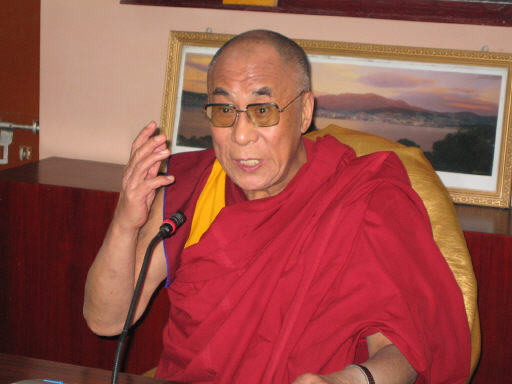 |
|
Dalai Lama
|
China may seek to block visit by religious leader
The Dalai Lama recently applied for a visa to visit Korea at the country’s embassy in India, according to a group organizing a conference of religious leaders scheduled for next month in Gwangju. While there has been discussion of a visit by the Tibetan Buddhist leader in the past, this is believed to be the first time he has formally applied for a visa to come to Korea. He has been invited to Korea by the Kim Dae-jung Presidential Library to participate in the "2006 Gwangju Summit for Nobel Peace Prize Laureates," and also by the thought and research group Manhae, which last year awarded the Dalai Lama its Manhae Award, a prize given in commemoration of the poet and Buddhist thinker Han Yong-un. Some twenty Nobel peace prize winners will participate in the Gwangju summit, to be held June 15-17, including former Soviet Union leader Mikhail Gorbachev, former Polish president Lech Walesa, and Guatemalan civil rights leader Rigoberta Menchu. The Nobel laureates are scheduled to participate in an academic seminar and issue a joint statement, preliminarily called the Gwangju Peace Declaration. Fifty religious leaders from twenty countries will be participating in the "World Religious Leaders’ Congress" June 7-14. The Dalai Lama would participate in both events. In 2000, 72 Korean religious denominations and non-governmental organizations formed something called the "Committee to Prepare for the Visit of the Dalai Lama to Korea" and issued the Tibetan leader numerous invitations to come to Korea. The Dalai Lama let it be known that he wanted to come to Korea, but in the end he never came, largely because the government at the time was concerned about opposition from the Chinese government.The Dalai Lama left Tibet when China’s 1959 invasion resulted in bloodshed. He fled to India, where he has been engaged in a campaign of nonviolence. Since the start of the year he has reportedly been negotiating with the Chinese government over a deal to abandon his struggle for Tibetan independence in exchange for a guarantee of religious freedom. "The atmosphere between China and the exiled Tibetan government is not what it used to be," said Dongguk University professor Yeon Gi-yeong, who is in charge of organizing the World Religious Leaders' Congress. "The Dalai Lama recently traveled to South American nations with close ties with China." He added that since the Korean event "is absolutely not political," there should be no reason for the government to prevent the Dalai Lama from participating. A government official said that in determining whether or not to issue the Dalai Lama a visa, officials are considering "the whole of Korea-China relations" and that a final decision has yet to be made. Another government official said that "because of China," it will be "difficult" to allow the Dalai Lama to visit Korea for the upcoming events.





